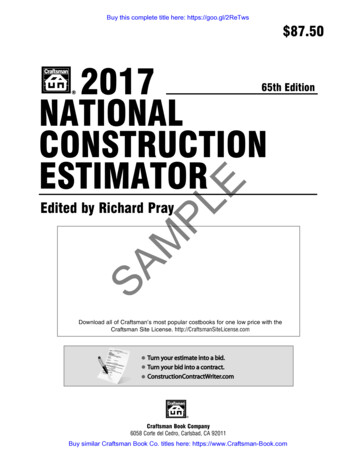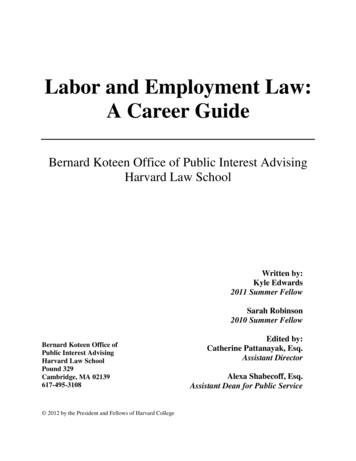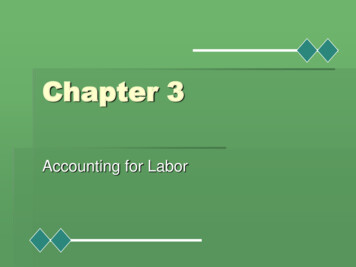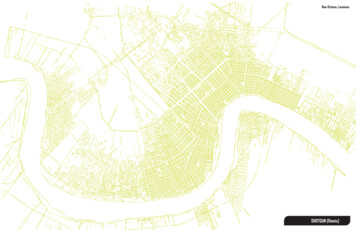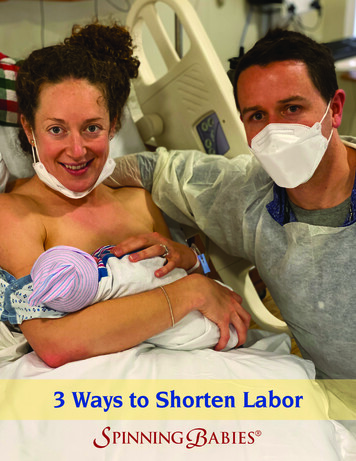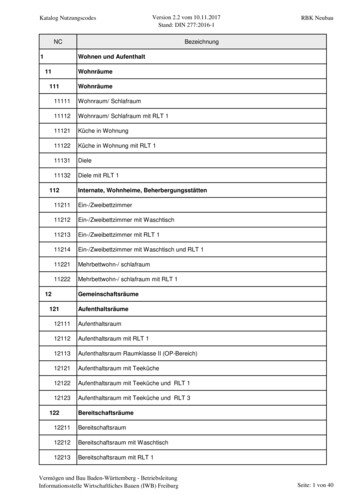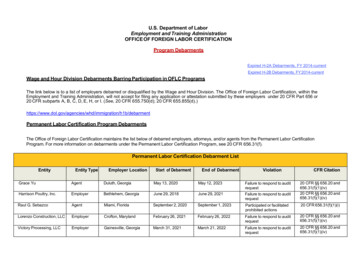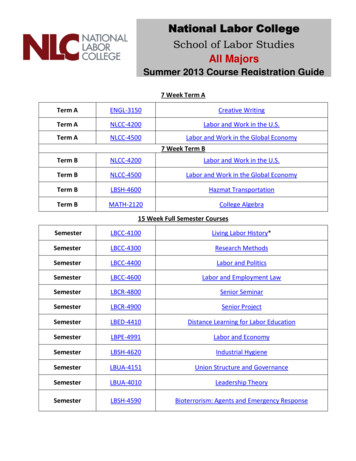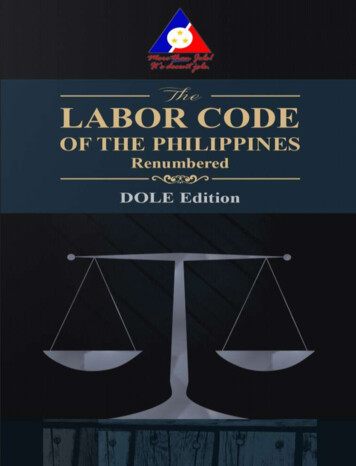
Transcription
FUTURE OF WORK COMMISSIONConvening 5Employment and Labor Lawin the New EconomyJanuary 16, 2020Jacobs Center for Neighborhood InnovationSan Diego, CAFUTURCOE OF WORKM MIS SIO N
ABOUT THE INSTITUTE FOR THE FUTURE (IFTF) AND ITS ROLEThe Institute for the Future (IFTF) is working with theCalifornia Labor Secretary and larger State Team tocoordinate the work of the Commission. IFTF draws onits over 50 years of research and experience in conveningdiscussions of urgent future issues to support the efforts ofthe Commission to build a strong vision for the future of workin the state. IFTF has been a leading voice in discussionsabout the future of work for the past decade, seekingpositive visions for a workforce undergoing transformationalchange. As a facilitator of the Commission’s work, it will helpguide the convenings, helping establish the comprehensiveunderstanding necessary to build a world-class workforce ofthe future. IFTF will draw on the work of its Equitable FuturesLab to frame these discussions of future jobs, skills, andlabor policy in terms of creating an equitable economy whereeveryone has access to the basic assets and opportunitiesthey need to thrive in the 21st century.ABOUT IFTFInstitute for the Future is the world’s leading futuresorganization. For over 50 years, businesses, governments,and social impact organizations have depended upon IFTFglobal forecasts, custom research, and foresight trainingto navigate complex change and develop world-readystrategies. IFTF methodologies and toolsets yield coherentviews of transformative possibilities across all sectors thattogether support a more sustainable future. Institute for theFuture is a registered 501(c)(3) nonprofit organization basedin Palo Alto, California. www.iftf.orgThe work of this Commission is supported in part byThe James Irvine Foundation, the Ford Foundation, theLumina Foundation, and Blue Shield of California Foundation.For more information on the California Future of WorkCommission, please contactAnmol Chaddha achaddha@iftf.org*All materials printed in house at IFTF 2019 Institute for the Future. All rights reserved. SR-2112B
FUCONTE NT S4TURCOE OF WORKM MIS SIO NSchedule of Convenings5 Overview of Convening 5:Employment and Labor Law in the New Economy8Design emental MaterialsFuture of Work Commission Convening 5
SCH E D U L E O F CONV E NINGS1 S eptember 10-11, 2019Overview: The Present and Future State of Work in CaliforniaLocation: Sacramento2 O ctober 10, 2019Technological Change and Its Impact on WorkLocation: Palo Alto3 November 14, 2019Education, Skills, and Job QualityLocation: Riverside4 D ecember 12, 2019Low-Wage Work and Economic EquityLocation: Los Angeles5 J anuary 16, 2020Employment and Labor Law in the New EconomyLocation: San Diego6 F ebruary 13, 2020Social Policy, Work, and Economic SecurityLocation: Stockton7 M arch 12, 2020Investors, Capital, and the Future of WorkLocation: San Francisco8 A pril 2, 2020SynthesisLocation: Sacramento4Institute for the Future
OV E RV IE WEMPLOYMENT AND LABOR LAW IN THE NEW ECONOMYGovernment policy most directly affects work and workers through employment and labor laws thatregulate the individual workplace and the labor market as a whole, as well as through the frameworkfor capitalism that is established through regulation. Labor laws set the floor when it comes to wages,hours, basic safety net provisions such as paid sick leave, health and safety standards, protection fromretaliation, and the power of the state to enforce these fundamental standards. Labor law also governshow workers can organize and bargain collectively over pay and working conditions. Employment lawcovers various conditions of the workplace, including prohibitions on harassment, discrimination andabuse as well as training requirements for managers and supervisors to prevent violations.Our current system of employment and labor law waslargely developed in the 1930s and 1940s for an erawith a different industrial and occupational structure.The transformation of work through innovations intechnology and other practices points to the need to adaptemployment and labor law to match the realities of worktoday and to anticipate the impact of technology and thefundamental organization of work in the future.The success of employers and the economy as a wholerests on a stable, skilled and secure workforce. The Futureof Work Commission has been challenged to considerthe role of employers in addition to unions, workers,and government in creating and protecting safe and fairworkplaces as well as supporting forms of work that couldprovide meaningful flexibility for workers. Importantly,a number of corporate leaders and large employers arereassessing their role and responsibility to their employees,as well as other stakeholders, and looking beyondshareholder value in setting their priorities and goals.Existing employment and labor laws are not wellenforced. Despite California’s strong scaffolding of workerprotections encoded in labor and employment law, existingpolicy is only as effective as its enforcement. Aggressiveand effective enforcement is often impeded by complexschemes designed to cover up violations, lack of trustin government, inadequate resources and ineffectiveapproaches to enforcement. Widespread violations ofemployment and labor law, most common and egregiousin low-wage industries, result in wage theft, abuses ofovertime laws, and unsafe working conditions that canresult in injury or death. The U.S. Department of Laborestimated in 2014 that the minimum wage law is violatedin California 372,000 times every week—that is, 1 in 8 lowwage workers being paid less than minimum wage.Employment and labor law do not actually cover allworkers in California, including agricultural and domesticworkers. Despite efforts to extend basic workplaceprotections to workers in these jobs, they are subject todangerous and precarious working conditions withoutthe protections afforded to other workers. The growth ofcontract work and decentralized work in recent decadeshas intensified, creating new challenges and opportunitiesfor worker organizing and unionization.Future of Work Commission Convening 55
EMPLOYMENT AND LABOR LAW IN THE NEW ECONOMYNew technologies enable new, unregulated forms ofworker surveillance. Technology enables companies tomonitor worker behavior across industries and workplaces,including productivity in warehouses, customer servicecenters and retail stores. Increasingly, white-collarworkplaces employ technology to monitor and collect dataon employees, and can even track movements through anoffice building, regulating speed of work and bathroom use,as an employee’s smartphone connects to different Wi-Firouters. Mining the data collected on employees couldeven predict or detect worker pregnancy, as reported bythe Wall Street Journal. Current employment law may notadequately cover new practices of worker surveillance thathave emerged or anticipate practices that will emerge in thecoming years.The use of data collected on employees raisessignificant equity issues, as algorithms are increasinglyused in hiring and managing workers. As algorithmsare increasingly used in hiring decisions and assessmentsof skills for setting wages and determining promotionalopportunities, the potential for algorithmic bias could leadto discrimination against specific groups. Since algorithmicdecision-making largely reproduces past behavior bydesign, it can also reproduce gender and racial disparitiescreated by past discrimination. The much less transparentprocesses of hiring and managing by algorithms mayrequire updated regulations and protections that are suitedfor these practices. Data collection on worker behaviorleads to many other questions around the use, value,threats and opportunities of such data. Who owns the vastamounts of data collected on employees, how it is used,who benefits from it, how it is monetized, and the level oftransparency related to its collection are all challenges inthe future of work.6Institute for the FutureArtificial intelligence and algorithm-based work requirean enormous amount of work by humans that oftengoes unseen. While artificial intelligence has the potentialto transform thousands of jobs and tasks, AI has to be“trained” with existing data and decisions and judgmentsthat are made by human workers, who are also neededto label, tag, and organize data. Much of this work,described as “automation’s last mile,” is broken downinto components and farmed out as piecework for ondemand gig workers. On social media platforms, contentmoderation is generally contracted out to a low-wageworkforce that are not direct employees of the social mediacompanies, raising issues of job quality and the intersectionof automation and human well-being. The growth of thiswork may require new policies to ensure transparency, fairwork conditions, and job quality.Some large employers are articulating an expandedrole of corporations beyond shareholder interests. Theprimacy of shareholder interests—which holds that theonly responsibility of business is to maximize profits—hasbeen deeply entrenched for decades, partly underlying anemphasis on minimizing labor costs as serving the interestsof shareholders. A group of large employers, the BusinessRoundtable, is promoting a new framework that prioritizesmultiple stakeholders, including employees, customers,suppliers and communities. In California, large firms withmore than 1,000 employees employ 15% of all workers inthe state.
FUTURCOE OF WORKM MIS SIO NABOUT THE CONVENINGSOME QUESTIONS TO CONSIDERThe fifth convening of the Future of Work Commissiontakes place in San Diego, one of the state’s largest metroareas and labor markets. The Commission will hearfrom external experts in the morning, and the afternoonwill be dedicated to substantive discussion amongCommissioners.1. W hat changes to existing law should be made or whatnew laws need to be in place to address shortcomings inexisting labor and employment law to ensure workers areprotected and have a voice in the workplace?The convening will begin with a panel on issues relatedto data in the workplace. Mary Gray (Microsoft Research)will draw on her extensive research on the workforce thatperforms much of the data work that powers the onlineeconomy. Ifeoma Ajunwa (Cornell University) and PaulineKim (Washington University) will provide perspectives onthe limitations of current employment law as it relates to thecollection of data on employees and its use by employers.This will be followed by a session on the current system oflabor law and its shortcomings with Sharon Block (HarvardLaw School), who is leading the Clean Slate Project, amajor effort to reform labor law in the U.S.Building on the session at the previous convening inDecember with small businesses, the Commission willthen have a conversation with Dane Linn (BusinessRoundtable) on the purpose of corporations in today’seconomy, from the perspective of large employers. Theperspectives of different types of employers is critical tothe Commission’s success in developing effective crosssector recommendations. In the afternoon, the Commissionwill continue its work on defining and developing a sharedunderstanding of the scope of the Commission’s work andbegin considering proposed solutions.2. S hould California implement a comprehensive policy onhow data is collected and used by employers, similarto the EU’s General Data Protection Regulation (GDPR),which governs the use of consumer data?3. W hat strategies or policies could encourage largeemployers to pursue a broader set of stakeholderinterests and discourage a singular focus onshareholder interests?4. W hat strategies or policies could support small- andmedium-sized employers who want to pursue a broaderset of stakeholder interests but are limited by fiercecompetition with larger companies and low marginsas a result?SELECTED RESOURCESCasey Newton. “The Secret Lives of Facebook Moderatorsin America.” The Verge. February 25, 2019.Business Roundtable. “Statement on the Purpose of aCorporation.” August 2019.Laura Tyson and Lenny Mendonca. “Making StakeholderCapitalism a Reality.” Project Syndicate. January 6, 2020.Economic Policy Institute. Unlawful. December 2019.Clean Slate project on labor law reform, Harvard LawSchool.Future of Work Commission Convening 57
DE S I G N PR I N C IPL E SThe Commission collectively developed the following design principles to createand evaluate recommendations.Bold: nothing should be excluded on the basis of political feasibilityForward-Facing: let’s not solve for the last warWork-Adjacent: include work plus housing, transportation, livingContext-Sensitive: take into account implications across gender, race, age, geographyCoalition-Building: bring together multiple stakeholdersPortfolio-Based: easy/fast to hard/long-termScalable: achieve high impactAgile and Iterative: can be prototyped and adapted as neededMeasurable: identify clear areas of potential impactActionable and Practical: grounded in real-world solutions that can be implemented8Institute for the Future
AG E NDAWEDNESDAY, JANUARY 15, 20207:00pm Employer Roundtable with Business forGood San Diego and RAISE San DiegoChapter on high road business practices8:45pmPublic Comment9:00pmAdjournTHURSDAY, JANUARY 16, pm Redefining the Purpose of Corporations:Perspectives from Large Employers10:20am Data in the Workplace:A New Frontier of Employment LawDane Linn, VP of Workforce & Education,Business RoundtableIfeoma Ajunwa, Assistant Professor,School of Industrial and Labor Relations,Cornell UniversityModerated by Lenny Mendonca, ChiefEconomic and Business Advisor;Director, Governor’s Office of Businessand Economic DevelopmentMary Gray, Senior Principal Researcher,Microsoft ResearchPauline Kim, Daniel Noyes Kirby Professorof Law and Co-Director, Center for EmpiricalResearch in the Law, Washington UniversityLaw SchoolLunch1:30pmBreak1:40pmCommissioner DiscussionFacilitated by Lyn Jeffery, Institutefor the FutureModerated by Julie Su, Secretary, Labor andWorkforce Development Agency4:30pm11:20am Labor Law for a New Economy:Fixing a Broken SystemPublic CommentNOTE: The Commission may not discuss ortake action on any matter raised during thepublic comment session, except to decidewhether to place the matter on the agenda ofa future meeting (Government Code sections11125, 1125.7(a)).Sharon Block, Executive Director, Labor andWorklife Program, Harvard Law SchoolModerated by Lande Ajose, Senior PolicyAdvisor for Higher Education5:00pmAdjournFuture of Work Commission Convening 59
PA N E L IS T SDATA IN THE WORKPLACE: A NEWFRONTIER OF EMPLOYMENT LAWM ARY GR AYSenior Principal ResearcherMicrosoft Research@marylgrayIFEOM A A JUNWAAssistant Professor, School ofIndustrial and Labor RelationsCornell University@iajunwaDr. Ajunwa is an Assistant Professorof Labor and Employment Law in theLaw, Labor Relations, and History Department of CornellUniversity’s Industrial and Labor Relations School (ILR),and Associated Faculty Member at Cornell Law School.She is also a Faculty Associate at the Berkman KleinCenter at Harvard Law School. In 2019, Dr. Ajunwa wasgranted the National Science Foundation (NSF) CAREERAward and in 2018 she received the Derrick Bell Awardfrom the Association of American Law Schools (AALS).Dr. Ajunwa’s research interests are at the intersection oflaw and technology with a particular focus on the ethicalgovernance of workplace technologies. Her research focusis also on diversity and inclusion in the labor market andthe workplace. Dr. Ajunwa’s scholarly articles have beenpublished or are forthcoming in both top law review andpeer review publications. Dr. Ajunwa earned her Ph.D.in Sociology from Columbia University. Her doctoralresearch on reentry received a grant from the NationalScience Foundation (NSF) and honorable mention fromthe Ford Foundation. She also holds a law degree from theUniversity of San Francisco School of Law and has beenadmitted to the Bar in the states of New York and California.Dr. Ajunwa’s forthcoming book, The Quantified Worker, willbe published by Cambridge University Press in 2020.10Institute for the FutureMary L. Gray is the co-author of GhostWork: How to Stop Silicon Valley fromBuilding a New Global Underclass released this May. Maryis a Senior Principal Researcher at Microsoft Research andan E.J. Safra Center for Ethics Fellow and Berkman KleinCenter for Internet and Society Faculty Affiliate at HarvardUniversity. Mary maintains a faculty position in the Schoolof Informatics, Computing, and Engineering with affiliationsin Anthropology and Gender Studies at Indiana University.Mary, an anthropologist and media scholar by training,focuses on how everyday uses of technologies transformpeople’s lives. She sits on several boards, includingPublic Responsibility in Medicine and Research andStanford University’s One-Hundred-Year Study on ArtificialIntelligence (AI100) Standing Committee, commissioned toreflect on the future of AI and recommend directions for itspolicy implications.PAULINE KIMDaniel Noyes Kirby Professor of LawCo-Director, Center for EmpiricalResearch in the LawWashington University Law SchoolPauline Kim is the Daniel Noyes KirbyProfessor of Law at Washington University Law Schoolin St. Louis. She is a nationally recognized expert on thelaw governing the workplace and has written widely onissues affecting workers, including privacy, discriminationand job security, as well as the impact of technology inthe workplace. Her current research focuses on the risksof unfairness and bias as automated decision-processesare incorporated into firms’ personnel decision-makingand the legal challenges posed by these technologicaldevelopments. She is studying the role of technologicalintermediaries in shaping labor markets, and thepossibilities for artificially intelligent systems to avoidhuman biases in making personnel decisions. She is agraduate of Harvard and Radcliffe Colleges and HarvardLaw School, and clerked for the Honorable Cecil F. Pooleon the Ninth Circuit Court of Appeals. Following herclerkship, she worked as a staff attorney at the EmploymentLaw Center/Legal Aid Society of San Francisco (now LegalAid at Work).
FUTURCOLABOR LAW FOR A NEW ECONOMY:FIXING A BROKEN SYSTEMSHARON BLOCKExecutive Director,Labor and Worklife ProgramHarvard Law School@sharblockSharon Block is Executive Directorof the Labor and Worklife Program and Lecturer on Lawat Harvard Law School. Prior to coming to Harvard LawSchool in 2017, she was the Principal Deputy AssistantSecretary for Policy at the U.S. Department of Labor andSenior Counselor to the Secretary of Labor. For twentyyears, Block has held key labor policy positions acrossthe legislative and executive branches of the federalgovernment. In 2012, President Obama appointed Block tobe a member of the National Labor Relations Board. Shewas senior labor and employment counsel to the SenateHealth, Education, Labor and Pensions Committee underSenator Edward Kennedy. While serving in the ObamaWhite House as Senior Public Engagement Advisor forLabor and Working Families, Block led the historic WhiteHouse Summit on Worker Voice. Block serves on a numberof labor-related board and advisory committees, includingas a board member of the National Employment LaborProject, advisory committee member for the Harvard T.H.Chan School of Public Health, Education and ResearchCenter, member of the Higher Quality Jobs AdvisoryCouncil of the Federal Reserve Bank of Boston and more.In addition, she writes frequently on labor and employmentissues and is a senior contributor to OnLabor.org. Blockreceived her B.A. from Columbia University and her J.D.from Georgetown University Law Center, where shereceived the John F. Kennedy Labor Law Award.E OF WORKM MIS SIO NREDEFINING THE PURPOSE OFCORPORATIONS: PERSPECTIVES FROMLARGE EMPLOYERSDANE LINNVice President, Workforce& EducationBusiness RoundtableDane Linn is a Vice President for theBusiness Roundtable. In this role, heoversees the Education & Workforce Committee, advancingthe BRT’s positions on education reform, U.S. innovationcapacity and workforce preparedness. He is also the leadstaff member for the Immigration Committee, promotingan approach to immigration reform that will help driveU.S. economic growth and keep the American workforceglobally competitive. Linn joins the BRT most recently fromThe College Board, where he served as Executive Directorof state policy. In addition, Linn has led national effortsto ensure more students are college- and career-readyand worked on issues related to STEM, early childhood,Perkins and the Workforce Investment Act, and high schoolredesign. Linn is a Ph.D. candidate at Virginia PolytechnicInstitute and State University, and holds a master’s degreein Education Administration from West Virginia GraduateCollege and bachelor’s degree in Elementary Education andSpecial Education from Cabrini College.Future of Work Commission Convening 511
COM MIS S IO NE RSROY BAHATDR. SOR AYA M . COLEYVenture CapitalistBloomberg BetaPresidentCal Poly Pomona@roybahatRoy Bahat invests in the future of workas a venture capitalist, with a focuson machine intelligence. Prior to his life as a VC, Bahatfounded start-ups, served as a corporate executive atNews Corp., and worked in government in the office ofNew York City mayor Michael Bloomberg. As the head ofBloomberg Beta, an investment firm with 150 million dollarsunder management, Bahat and his team have invested inareas like automation, data, robotics, media, productivitytools, and many others. Fast Company named Bahatone of the Most Creative People in Business and noted“Bahat is a natural innovator . one of the most candidpeople you’ll ever meet (check out his LinkedIn profile).” Heorganized “Comeback Cities,” where he leads groups ofventure capitalists and members of Congress on bus toursto find the untapped beds of talent and entrepreneurshipin America. He also co-chaired the Shift Commission onWork, Workers, and Technology, a partnership betweenBloomberg and think-tank New America to look atautomation and the future of work 10 to 20 years from now.DOUG BLOCHPolitical DirectorTeamsters Joint Council 7@TeamsterDougDoug Bloch has been political directorat Teamsters Joint Council 7 since 2010.In this capacity, he works with over 100,000 Teamstersin Northern California, the Central Valley, and NorthernNevada in a variety of industries. He was the Port ofOakland campaign director for Change to Win from 2006 to2010 and a senior research analyst at Service EmployeesInternational Union Local 1877 from 2004 to 2006. Mr.Bloch was statewide political director at the CaliforniaAssociation of Community Organization for Reform Now(ACORN) from 2003 to 2004 and ran several ACORNregional offices, including Seattle and Oakland, from 1999to 2003. He was an organizer at the Non-GovernmentalOrganization Coordinating Committee for NortheastThailand from 1999 to 2003.12Institute for the Future@PresColeyCPPDr. Soraya M. Coley, a veteranadministrator with more than 20 years ofexperience in higher education, became the sixth presidentof Cal Poly Pomona in January 2015. Coley transitionedto Cal Poly Pomona from Cal State Bakersfield, whereshe was the provost and vice president for academicaffairs from 2005 to 2014. She also served as interim vicepresident for university advancement in 2011–12. Herexperience includes serving as Cal State Fullerton’s deanof the College of Human Development and CommunityService, as administrative fellow, and professor anddepartment chair for the human services department.She was the system-wide provost and vice president foracademic affairs at Alliant International University, from2001 to 2003. Coley earned a bachelor’s in sociology fromLincoln University, a master’s in social planning and socialresearch from Bryn Mawr, and a doctoral degree in socialplanning and policy from Bryn Mawr. She is married to RonColey, Lt. Col. (Ret.) USMC, who after his military service,enjoyed a distinguished career in public service and highereducation administration, including six years as SeniorCounty Administrator in Orange County, California, andmultiple senior positions at the University of California.LLOYD DEANChief Executive OfficerCommonSpirit Health@LloydHDeanLloyd Dean is chief executive officer ofCommonSpirit Health, a newly creatednational health care system formed by Dignity Health andCatholic Health Initiatives. He is co-chair of the CaliforniaFuture Health Workforce Commission, chair of the Boardof Directors for the Committee on Jobs in San Francisco,and a member of the McDonald’s Board of Directors. Deanholds degrees in sociology and education from WesternMichigan University and received an honorary Doctorof Humane Letters degree from the University of SanFrancisco. A strong advocate for health care reform, hehas been actively engaged with President Obama and theWhite House Cabinet on healthcare issues.
FUTURCOE OF WORKM MIS SIO NJENNIFER GR ANHOL MM ARY K AY HENRY, CO-CHAIRFormer GovernorState of MichiganInternational PresidentService Employees International Union(SEIU)@JenGranholmJennifer Granholm served two termsas Michigan’s 47th governor from2003 to 2011, and was the Michigan Attorney Generalfrom 1998-2002. As Governor, Granholm led the statethrough a brutal economic downturn that resulted from theGreat Recession and a meltdown in the automotive andmanufacturing sectors. She worked relentlessly to diversifythe state’s economy, strengthen its auto industry, preservethe manufacturing sector, and add new, emerging sectors,such as clean energy, to Michigan’s economic portfolio.After leaving office, Granholm served as an advisor toPew Charitable Trusts’ Clean Energy Program, where sheled a national campaign for clean energy policies. Shealso hosted Current TV’s political news analysis show“The War Room with Jennifer Granholm” and co-authoredA Governor’s Story: The Fight for Jobs and America’sEconomic Future, which tells how Michigan pioneered waysout of an economic storm and offers proven advice for anation desperate to create jobs. Currently, Granholm is acontributor to CNN, a Senior Advisor to the progressivepolitical groups Media Matters and American Bridge, is headof the sustainability practice at Ridge-Lane, and sits onnumerous private sector and non-profit boards.L ANCE HASTINGS@MaryKayHenryMary Kay Henry is International Presidentof the 2 million-member Service Employees InternationalUnion (SEIU), and her leadership is rooted in a deep-seatedbelief that when individuals join together they can makethe impossible possible. Under her leadership, SEIU haswon major victories to improve working families’ lives bystrengthening and uniting healthcare, property services, andpublic sector workers with other working people across theUnited States, Canada and Puerto Rico. In 2010, Mary KayHenry became the first woman elected to lead SEIU, aftermore than 30 years of helping unite healthcare workers. By2015, she was named one of the 100 most creative leadersby Fast Company magazine and was included in the top 50visionaries reshaping American politics by Politico magazinefor SEIU’s innovative leadership in propelling the fight forliving wages embodied in the historic movement known asthe “Fight for 15.” Henry believes that to better fulfill thepromise of a just society America has always aspired to be,we must fight for justice on all fronts including defending thegains accomplished for access to affordable healthcare forall families under the Affordable Care Act, comprehensiveimmigration reform and a path to citizenship for allhardworking immigrant families, and safety and justice in allcommunities of color across the country.PresidentCalifornia Manufacturers &Technology Association@lance hastingsHastings has held several leadershiproles at MillerCoors the past 15 years. He served mostrecently as Vice President of National Affairs for MillerCoors.Prior to that he served as Head of Regulatory & Tax Affairsfor SABMiller. He also represented Miller Brewing Companyand MillerCoors in Sacramento as Director of StateGovernment Affairs, where he served on CMTA’s Boardof Directors. Before his long career as a manufacturingexecutive Hastings was the Vice President and Director ofGovernment Relations from 1998 to 2003 at the CaliforniaGrocers Association. Hastings also worked in the CaliforniaState Legislature for almost a decade as a chief consultant,starting in 1989. Hastings has a Bachelors of Arts inEconomics and a Minor in Government from California StateUniversity at Sacramento.Future of Work Commission Convening 513
COM MIS S IO NE RSCARL A JAVITSPresident & CEORoberts Enterprise DevelopmentFund (REDF)@cjavitsredfCarla Javits is President and CEOof REDF (The Roberts Enterprise Development Fund), apioneering venture philanthropy galvanizing a nationalmovement of social enterprises—purpose-driven,revenue-generating businesses that help people striving toovercome employment barriers get good jobs, keep thosejobs, and build better lives. Through her stewardship, REDFhas invested in 183 social enterprises in 26 states. Thesebusinesses have generated 755 million in revenue andemployed 37,700 people—and counting. REDF’s goal is tosee 50,000 people employed by 2020, contributing theirskills and talents to our communities and helping to build astronger, more inclusive society.SARU JAYAR A M ANPresidentROC United & ROC Action, Directorof the Food Labor Research Center@SaruJayaramanSaru is the President of One Fair Wage,Co-Founder of the Restaurant Opportunities CentersUnited (ROC United), and Director of the Food LaborResearch Center at the University of California, Berkeley.Saru is a graduate of Yale Law School and the HarvardKennedy School of Gover
EMPLOYMENT AND LABOR LAW IN THE NEW ECONOMY. Future of Work Commission Convening 5 7 F U T U R E OF W O R K C O M IS N ABOUT THE CONVENING The fifth convening of the Future of Work Commission takes place in San Diego, one of the state’s larges
